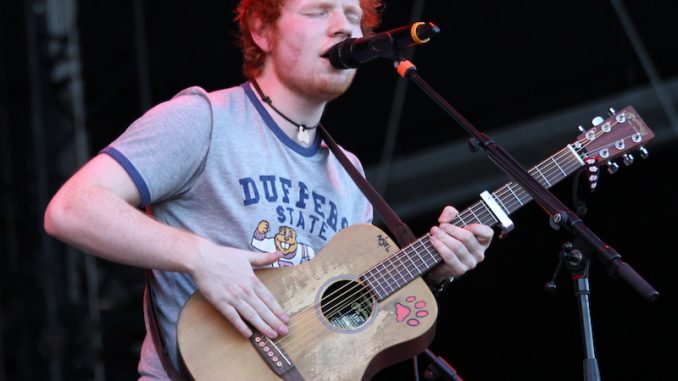
Back in 2014, BBC Radio 1Xtra rightfully earned flack for its list of the 20 most powerful entertainers in the UK’s urban music scene, on which Ed Sheeran held the number one spot.
The most attentive listeners of Sheeran’s may recognize Sheeran’s Saltine cracker jams to be anything but urban, and in fact, this seemed like Sheeran’s whole selling point: he’s an inoffensive presence whose Hallmark tales of love and heartbreak are just generic enough to be identifiable to the lowest common denominator. Someone, at some point, however, decided that if Sheeran wasn’t lovingly accepted by all as a representative of black music coming from the UK, he would be in short time. That can be the only explanation as to why Sheeran decided to rap as much as he does on Divide, his third studio album — and the worst part is, Sheeran’s embarrassing brand of “fish n’ chip”-hop is far from the only problem with this record.
If subtlety was a woman, she friend-zoned Ed Sheeran a long time ago. For every loved one he sings about, he seems to have some vague, undetailed recollection about his time spent with them. On “Castle on the Hill,” he reminisces about his childhood, singing, “We watched the sunset on the castle on the hill,” and in “Perfect,” the chorus leads with Sheeran recounting a memory of dancing in the dark, “Barefoot on the grass, listening to our favorite song.” This painfully literal songwriting is all-too pervasive on this album — it’s the centerpiece of nearly every track on Divide, from the “urban”-inspired “Galway Girl” to the loving tribute “Supermarket Flowers.” Sheeran only seems to know how to write songs within this third-person, past tense framework, and its limitations reveal themselves very early in the album. But where a more cunning artist might find creative ways to distract from their lyrical shortcomings, Sheeran can’t seem to muster so much as a single song that falls outside of his maudlin pop rock wheelhouse.
There’s a feigned earthiness to his music, a façade of “average Joe” relatability underlying much of Divide’s thematic structure. In some ways, it feels as if Sheeran is aping the heartland rock formula, specifically emulating the small-town modesty of an artist like John Mellencamp (and it cannot be stressed enough how little we need another John Mellencamp). Divide is essentially the soundtrack to Sheeran’s life as told through the kind of low-budget slideshow one might see at their own bar mitzvah. It offers little in the way of theme beyond Sheeran’s own nostalgia, and his “Golly, I miss those simpler days” sentiments come with minimal reflection from the present.
What Sheeran may not understand is that it’s not just enough for a songwriter to simply relive past events; the audience also needs to know why these experiences matter. Did they facilitate some sort of personal change? Do they, in some way, inform the present? Sheeran fails to answer these questions, and a result, Divide comes across more like an unorganized amateur scrapbook than a purposeful piece of storytelling.
This, however, is hardly shocking: Sheeran has always lacked any sort of concrete perspective in his songs, and it grows more wearisome by the year. “Perfect” retreads the same ground as Sheeran’s 2014 hit “Thinking Out Loud,” and there are literal back-to-back songs in the track list (“Happier” and “New Man”) about Sheeran running into an ex-girlfriend only to discover her new beau makes her happier.
Taylor Swift’s oeuvre may be notoriously unshakable in its commitment to heartbreak anthems, but at least the production on an album like 1989 is adventurous and diverse enough to give each song a unique musical identity in lieu of a lyrical one. Divide isn’t. Despite it being his third album, on Divide Sheeran stubbornly remains as unpolished and unoriginal a songwriter as he’s ever been, and no amount of rapping will ever change that.
